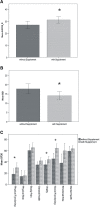Weight loss, dysphagia and supplement intake in patients with amyotrophic lateral sclerosis (ALS): impact on quality of life and therapeutic options
- PMID: 23848967
- PMCID: PMC3717067
- DOI: 10.1186/1471-2377-13-84
Weight loss, dysphagia and supplement intake in patients with amyotrophic lateral sclerosis (ALS): impact on quality of life and therapeutic options
Abstract
Background: Weight loss is a frequent feature in the motor neuron disease Amyotrophic lateral sclerosis (ALS). In this study we investigated possible causes of weight loss in ALS, its impact on mood/quality of life (QOL) and the benefit of high calorie nutritional/other dietary supplements and percutaneous endoscopic gastrostomy (PEG).
Methods: 121 ALS patients were interviewed and answered standardized questionnaires (Beck depression inventory - II, SF36 Health Survey questionnaire, revised ALS functional rating scale). Two years after the initial survey we performed a follow-up interview.
Results: In our ALS-cohort, 56.3% of the patients suffered from weight loss. Weight loss had a negative impact on QOL and was associated with a shorter survival. Patients who took high calorie nutritional supplements respectively had a PEG stated a great benefit regarding weight stabilization and/or QOL.38.2% of our patients had significant weight loss without suffering from dysphagia. To clarify the reasons for weight loss in these patients, we compared them with patients without weight loss. The two groups did not differ regarding severity of disease, depression, frontotemporal dementia or fasciculations, but patients with weight loss declared more often increased respiratory work.
Conclusions: Weight loss is a serious issue in ALS and cannot always be attributed to dysphagia. Symptomatic treatment of weight loss (high calorie nutritional supplements and/ or PEG) should be offered more frequently.
Figures



References
MeSH terms
LinkOut - more resources
Full Text Sources
Other Literature Sources
Medical
Miscellaneous

